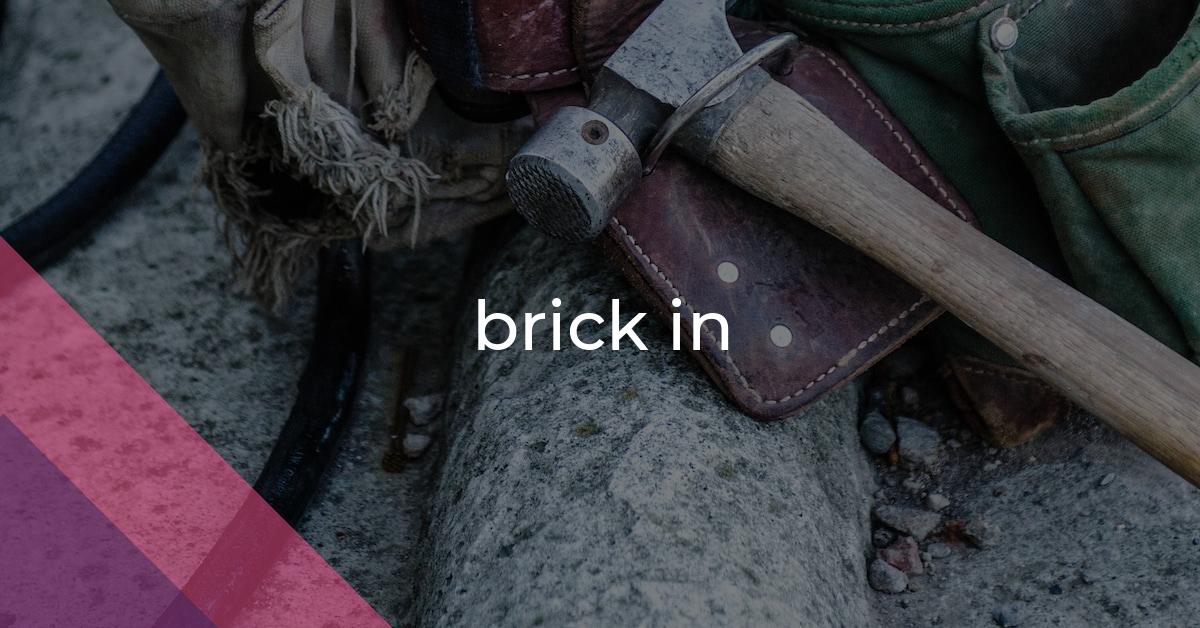brick in: Idiom Meaning and Origin
What does ‘brick in’ mean?
The idiom "brick in" means to close or seal off an area or entrance, often as a way of preventing access or escape. It can also refer to isolating oneself from others or shutting down emotionally.

Idiom Explorer
The idiom "run into a brick wall" means to encounter an obstacle or difficulty that is impossible to overcome or make progress with.
The idiom "fence in" means to enclose or confine someone or something within a limited space or boundaries, restricting their freedom or movement.
The idiom "drop a brick" means to say or do something embarrassing or tactless unintentionally.
The idiom "dig one's heels in" means to refuse to change one's mind or course of action despite pressure or opposition.
"Dig oneself in a hole" means to get oneself into a difficult or embarrassing situation, usually as a result of one's own actions or words.
The idiom "dig in" means to start eating eagerly or to begin working hard or with determination.
The idiom "darken a church door" means to enter a church, usually with the connotation of doing so infrequently or reluctantly.
The idiom "close the face" means to become silent or refuse to speak about something, usually a topic that is embarrassing or unpleasant. It implies shutting down communication or avoiding discussion to avoid further conflict or discomfort.
The idiom "close one's mind" means to refuse to consider new ideas or opinions, or to be unwilling to change one's beliefs or opinions.
The idiom "close one's eyes" means to ignore or overlook something intentionally, often to avoid facing unpleasant or uncomfortable truths or situations.
Infiltrating the Wall
The idiom "brick in" encompasses multiple meanings, depending on the context in which it is used. One common interpretation of this idiom pertains to the realm of construction and building. In this sense, "brick in" signifies the process of incorporating a brick into a structure, typically by using mortar or cement to firmly affix it in place.
Another figurative meaning of "brick in" revolves around the notion of enclosure or confinement. This can be observed in phrases like "brick in a person" or "brick in a memory." In such instances, the idiom implies a sense of restriction, as if the individual or the memory is being ensnared or enclosed within boundaries.
The idiom "brick in" can also be employed to describe the act of impeding or obstructing progress or movement. For example, one might say "they brick in the project" to convey the idea that they are hindering its development or preventing it from advancing further.
A related idiom, "fence in," bears similarities to the concept of "brick in" in terms of confinement and restriction. "Fence in" refers to the act of enclosing or surrounding an area with a fence, thereby limiting access or creating a boundary. This idiom shares the idea of constriction and containment with "brick in," highlighting the overarching theme of restriction present in both idioms.
The idiom "brick in one's hat" is an offshoot of the broader "brick in" family. It is less commonly used and carries a more specific meaning. "Brick in one's hat" suggests a state of deep contemplation or being absorbed in thought. It signifies a mental confinement, as if one's mind is enclosed within the confines of introspection. This idiom provides another angle for understanding the overarching theme of constraint associated with "brick in" and its related expressions.
Similarly, the idiom "break in" shares a link with "brick in" in terms of obstruction and interference. "Break in" refers to the act of forcefully intruding into a place or situation, often with the intention of causing disruption or gaining unauthorized access. This idiom connotes a form of interference that hampers the natural flow or progression of events, much like the obstruction implied by "brick in."
Lastly, the idiom "built like a brick outhouse" showcases yet another facet of the "brick in" family. This idiom is typically used to describe someone or something that is physically strong, solid, and sturdy. It emphasizes the durability and immovability that are often associated with structures made of bricks, further reinforcing the connection between "brick in" and construction-related imagery.
The exact origins of the idiom "brick in" remain somewhat elusive, as there is limited information available regarding its etymology. However, given its association with construction and building, it can be inferred that the idiom likely originated from the literal act of placing bricks in a structure. Over time, this literal meaning expanded to encompass metaphorical and symbolic notions of enclosure and hindrance. This evolution illustrates the dynamic nature of idiomatic language and its ability to adapt and develop over time.
The idiom "brick in" carries diverse interpretations, ranging from the concrete act of securing a brick in a building to metaphorical expressions of confinement and obstruction. While the precise origins of this idiom may be uncertain, its associations with construction and restriction offer valuable insights into its meaning. The utilization of related idioms, such as "fence in," "brick in one's hat," "break in," and "built like a brick outhouse," further enhances our understanding of the overarching theme of constraint inherent in the "brick in" family. These idiomatic expressions exemplify the richness and complexity of language, with their significance often deeply rooted in cultural and historical contexts.
Example usage
Here are three examples of how the idiom "brick in" can be used in a sentence:
- He decided to brick in the window to make the room more soundproof.
- The construction worker was instructed to brick in the opening to the basement.
- She wanted to brick in the old fireplace to create more wall space in the living room.
The idiom "brick in" is often used to describe the action of building or sealing something with bricks, typically a window or opening. It implies the process of enclosing or filling in an area with bricks to remove or minimize the opening.
More "Construction" idioms



